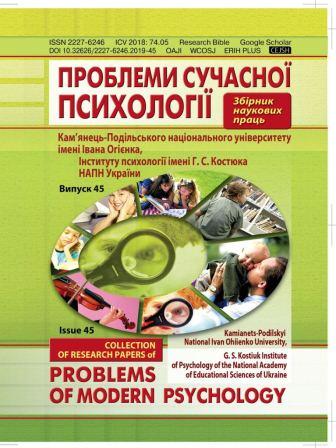Modern Multiplication as a Shaping Factor of Emotional Disturbances in Pre-School Children
DOI:
https://doi.org/10.32626/2227-6246.2019-45.280-295Keywords:
emotional sphere of preschool children, emotional disturbances, psychological analysis of multiplication, anxiety, aggression, fears.Abstract
This article examines the topical issue of emotional disturbances in preschool
children and the role of multiplication in such disturbances. Its aim is to ana-
lyze the role of modern multiplication theoretically and experimentally in the
shaping of emotional disturbances in preschool children.
The article provides theoretical analysis of preschoolers’ emotional
sphere developmental features and emotional disturbances emergence in a
given age group. The main types of preschool emotional disturbances and
the reasons for their emergence are analyzed. Modern multiplication is ac-
knowledged to be one of major factors for emotional disturbances shaping in
preschool children.
The empirical research on the in0xFB02uence of modern multiplication on emo-
tional disturbances shaping in preschool children was conducted. Empirical
methods of psychological research, such as questionnaire and psychodiagnos-
tic methodologies, were employed.
Children’s multiplication preferences and their perception of animated
0xFB01lms and their main characters are empirically identi0xFB01ed. Psychological analy-
sis of the chosen animated 0xFB01lms and their main characters is represented to
identify their in0xFB02uence on preschoolers’ mentality. The majority of the most
popular animated cartoons under analysis are found to have a negative e0exFB00ct
on preschool children’s mentality. The following emotional disturbances in
preschoolers are empirically identi0xFB01ed: fears, aggression and anxiety. Certain
connection between the emotional disturbances in preschoolers and the type
of multiplication they prefer is diagnosed. As a result, the hypothesis that most
of modern multiplication in0xFB02uence preschool children’s emotional sphere and
trigger emotional disturbances was con0xFB01rmed.
References
Abramenkova, V. V. (2006). Vo chto igrajut nashi deti [What Do Our Children Play With? Toy and Anti toy]. Moskva : Jauza, Jeksmo, Lepta Kniga [in Russian].
Abramenkova, V. V., & Bogatyreva, A. L. (2006). Deti i televisionnyj jekran [Children and a Telescreen]. Vospitanie shkol’nikov – Schoolchildren Upbringing, 6, 28–31 [in Russian].
Aromashtam, M. (2006). Deti smotrjat mul’tfil’my: psihologo-pedagog icheskie zametki. Praktika proizvodstva mul’tfil’mov v detskom sadu [Children Watch Cartoons – Psychological and Pedagogical Notes. Cartoon Production Practice in Kindergartens]. Moskva : Chistye prudy [in Russian].
Hordiienko, D. O., & Kovalenko, V. V. (2012). Vplyv animatsiinykh filmiv na riven tryvozhnosti ditei molodshoho shkilnoho viku [The Influence of Animated Cartoons on Pre-school Children Anxiety Level]. Visnyk DNU. Seriia «Pedahohika i psykholohiia» – DNU Bulletin. Pedagogy and Psychology Edition, 18, 57–65 [in Ukrainian].
Zaharov, A. I. (1986). Kak preodolet’ strahi u detej [How to Master Children’s Fears]. Moskva : Pedagogika [in Russian].
Medvedeva, I., Shishova, T. (2006). «Kto soblaznit malyh sih…»: SMI protiv detej [«Who will seduce these kids…»: Mass media against children]. Moskva : Hristianskaja zhizn’ [in Russian].
Minenko, O. (2018). Psykholohichnyi analiz suchasnoi multyplikatsiinoi produktsii ta yii vplyv na psykhichnyi rozvytok dytyny [Psychological Analysis of Modern Animated Cartoons and Their Influence on a Child’s Mental Development]. Problemy suchasnoi psykholohii – Problems of Modern Psychology: Collection of research papers of Kamianets-Podilskyi Ivan Ohienko National University, G. S. Kostiuk Institute of Psychology at the National Academy оf Educational Sciences of Ukraine, 41, 188–204. Kamianets-Podilskyi : Aksioma. DOI 10.32626/2227-6246.2018-41 [in Ukrainian].
Pavelkiv, R. V., & Tsyhypalo, O. P. (2008). Dytiacha psykholohiia [Child Psychology]. Kyiv : Akademvydav [in Ukrainian].
Timoshina, I. M., & Morozova, A. V. (2013). Vlijanije mul’tfil’mov na psihicheskoe razvitie rebenka [The influence of Animated Cartoons on a Child’s Mental Development]. Spravochnik pedagoga-psihologa. Detskij sad – Educator’s and Psychologist’s Guide. Kindergarten, 5, 49–58 [in Russian].
Shykyrova, N. (2006). ZMI yak dzherelo nehatyvnykh emotsiinykh staniv dytyny [Mass Media as a Cause for Child Negative Emotional Conditions]. Psykholoh – Psychologist, 2–3, 45–46 [in Ukrainian].
Koshelevа, A. D. (Eds.) (1985). Jemotsional’noe razvitie doshkol’nika [Emotional Development of a Pre-school Child]. Moskva : Prosveshchenie [in Russian].
American Academy of Pediatrics. Children, Adolescents, and the Media (2013). Pediatrics, 132, № 5 (November), 958–961. DOI 10.1542/peds.2013_2656.
Downloads
Published
How to Cite
Issue
Section
License
Copyright
The Editorial Board has the full right to publish original scientific papers containing results of theoretical and experimental research works which are not currently subject to review for publication in other scientific editions. The Author shall transfer to the editorial board of the Collection the right to spread the electronic version of the paper, as well as the electronic version of the paper translated into English (for papers originally submitted in Ukrainian and Russian) by all kinds of electronic means (placement at the official website of the Collection, electronic databases, repositories etc).
The Author of an article reserves the right to use materials of the paper, without approval with the editorial board and the founders of this Collection: a) partially or fully, for educational purposes; b) for writing own dissertation papers; c) for preparation of abstracts, conference reports and presentations.
The Author of an article can place electronic copies of the paper (including the final electronic version downloaded from the official website of the Collection) at:
- personal web resources of all Authors (websites, webpages, blogs etc.);
- web resources of the institutions where the Authors are employed (including electronic institutional repositories);
- non-profit public access web resources (for example, arXiv.org).
But in all cases, it is obligatory to have a bibliographic reference to the paper, or a hyperlink to its electronic copy placed at the official website of this Collection.






